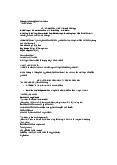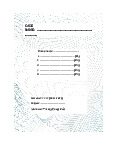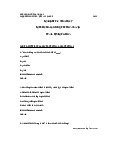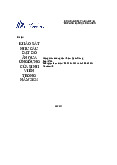









Preview text:
SAFETY DATA SHEET Spheerol EPL 1
SECTION 1: Identification of the substance/mixture and of the company/undertaking Product identifier Spheerol EPL 1 SDS # 451355 Code 451355-BE02
Relevant identified uses of the substance or mixture and uses advised against Product use
Grease for industrial applications
For specific application advice see appropriate Technical Data Sheet or consult our company representative. Manufacturer BP Lubricants USA Inc. 1500 Valley Road Wayne, NJ 07470 Telephone: +1-888-CASTROL
Product Information: +1-877-641-1600 Supplier
PAN AMERICAN ENERGY LLC, SUCURSAL
ARGENTINA AV. LEANDRO N. ALEM 1180 PISO 11 – C1001AAT
CIUDAD AUTÓNOMA DE BUENOS AIRES.
Consultas Técnicas 0800-888-8088 EMERGENCY HEALTH
TELÉFONO PARA EMERGENCIAS (24 HORAS) CIQUIME: 0800-222-2933 INFORMATION: +1-800-424-9300 (CHEMTREC USA)
+1-703-527-3887 (CHEMTREC outside the US) EMERGENCY TELEPHONE NUMBER
SECTION 2: Hazards identification Classification of the SKIN IRRITATION - Category 3 substance or mixture GHS label elements Signal word Warning Hazard statements
H316 - Causes mild skin irritation. Precautionary statements Prevention Not applicable. Response
P332 + P313 - If skin irritation occurs: Get medical attention. Storage Not applicable. Disposal Not applicable. Other hazards which do not Defatting to the skin. result in classification
Note: High Pressure Applications
Injections through the skin resulting from contact with the product at high pressure
constitute a major medical emergency.
See 'Notes to physician' under First-Aid Measures, Section 4 of this Safety Data Sheet. Product name Spheerol EPL 1 Product code 451355-BE02 Page: 1/10 Date of issue 11/04/2019. Format Argentina Language ENGLISH Version 3 (AR) (ENGLISH)
SECTION 3: Composition/information on ingredients Substance/mixture Mixture
Highly refined base oil (IP 346 DMSO extract < 3%). Thickening agent. Proprietary performance additives. Other means of Not available. identification Ingredient name CAS number %
Phosphorodithioic acid, mixed O,O-bis(2-ethylhexyl and iso-Bu and iso-Pr) 85940-28-9 <2.5 esters, zinc salts
There are no additional ingredients present which, within the current knowledge of the supplier and in the
concentrations applicable, are classified as hazardous to health or the environment and hence require reporting in this section.
Occupational exposure limits, if available, are listed in Section 8. SECTION 4: First aid measures
Description of necessary first aid measures Eye contact
In case of contact, immediately flush eyes with plenty of water for at least 15
minutes. Eyelids should be held away from the eyeball to ensure thorough rinsing.
Check for and remove any contact lenses. Get medical attention. Skin contact
In case of contact, immediately flush skin with plenty of water for at least 15 minutes
while removing contaminated clothing and shoes. Wash skin thoroughly with soap
and water or use recognized skin cleanser. Wash clothing before reuse. Clean
shoes thoroughly before reuse. Get medical attention if symptoms occur. Inhalation
If inhaled, remove to fresh air. Get medical attention if symptoms occur. Ingestion
Do not induce vomiting unless directed to do so by medical personnel. Never give
anything by mouth to an unconscious person. If unconscious, place in recovery
position and get medical attention immediately. Get medical attention if adverse
health effects persist or are severe. Protection of first-aiders
No action shall be taken involving any personal risk or without suitable training. It
may be dangerous to the person providing aid to give mouth-to-mouth resuscitation.
Most important symptoms/effects, acute and delayed
See Section 11 for more detailed information on health effects and symptoms.
Indication of immediate medical attention and special treatment needed, if necessary Notes to physician
Treatment should in general be symptomatic and directed to relieving any effects.
Note: High Pressure Applications
Injections through the skin resulting from contact with the product at high pressure
constitute a major medical emergency. Injuries may not appear serious at first but
within a few hours tissue becomes swollen, discolored and extremely painful with
extensive subcutaneous necrosis.
Surgical exploration should be undertaken without delay. Thorough and extensive
debridement of the wound and underlying tissue is necessary to minimize tissue
loss and prevent or limit permanent damage. Note that high pressure may force the
product considerable distances along tissue planes. Specific treatments No specific treatment. Product name Spheerol EPL 1 Product code 451355-BE02 Page: 2/10 Date of issue 11/04/2019. Format Argentina Language ENGLISH Version 3 (AR) (ENGLISH)
SECTION 5: Firefighting measures Extinguishing media Suitable extinguishing
In case of fire, use water fog, alcohol resistant foam, dry chemical or carbon dioxide media extinguisher or spray. Unsuitable extinguishing Do not use water jet. media Specific hazards arising
In a fire or if heated, a pressure increase will occur and the container may burst. from the chemical Hazardous thermal None expected. decomposition products Special protective actions
No action shall be taken involving any personal risk or without suitable training. for fire-fighters
Promptly isolate the scene by removing all persons from the vicinity of the incident if there is a fire. Special protective
Fire-fighters should wear positive pressure self-contained breathing apparatus equipment for fire-fighters (SCBA) and full turnout gear.
SECTION 6: Accidental release measures
Personal precautions, protective equipment and emergency procedures For non-emergency
Contact emergency personnel. No action shall be taken involving any personal risk personnel
or without suitable training. Evacuate surrounding areas. Keep unnecessary and
unprotected personnel from entering. Do not touch or walk through spilled material.
Avoid breathing vapor or mist. Provide adequate ventilation. Put on appropriate
personal protective equipment. Floors may be slippery; use care to avoid falling. For emergency responders
Entry into a confined space or poorly ventilated area contaminated with vapor, mist
or fume is extremely hazardous without the correct respiratory protective equipment
and a safe system of work. Wear self-contained breathing apparatus. Wear a
suitable chemical protective suit. Chemical resistant boots. See also the
information in "For non-emergency personnel". Environmental precautions
Avoid dispersal of spilled material and runoff and contact with soil, waterways,
drains and sewers. Inform the relevant authorities if the product has caused
environmental pollution (sewers, waterways, soil or air).
Methods and materials for containment and cleaning up Small spill
Stop leak if without risk. Move containers from spill area. Absorb with an inert
material and place in an appropriate waste disposal container. Dispose of via a
licensed waste disposal contractor. Large spill
Stop leak if without risk. Move containers from spill area. Approach release from
upwind. Prevent entry into sewers, water courses, basements or confined areas.
Contain and collect spillage with non-combustible, absorbent material e.g. sand,
earth, vermiculite or diatomaceous earth and place in container for disposal
according to local regulations. Contaminated absorbent material may pose the
same hazard as the spilled product. If emergency personnel are unavailable,
contain spilled material. Suction or scoop the spill into appropriate disposal or
recycling vessels, then cover spill area with oil absorbent. Dispose of via a licensed waste disposal contractor. Product name Spheerol EPL 1 Product code 451355-BE02 Page: 3/10 Date of issue 11/04/2019. Format Argentina Language ENGLISH Version 3 (AR) (ENGLISH)
SECTION 7: Handling and storage Precautions for safe handling Protective measures
Put on appropriate personal protective equipment (see Section 8). Do not ingest.
Avoid contact with eyes, skin and clothing. Avoid breathing vapor or mist. Keep in
the original container or an approved alternative made from a compatible material,
kept tightly closed when not in use. Empty containers retain product residue and
can be hazardous. Do not reuse container. Advice on general
Eating, drinking and smoking should be prohibited in areas where this material is occupational hygiene
handled, stored and processed. Wash thoroughly after handling. Remove
contaminated clothing and protective equipment before entering eating areas. See
also Section 8 for additional information on hygiene measures. Conditions for safe storage,
Store in accordance with local regulations. Store in original container protected including any
from direct sunlight in a dry, cool and well-ventilated area, away from incompatible incompatibilities
materials (see Section 10) and food and drink. Keep container tightly closed and
sealed until ready for use. Store and use only in equipment/containers designed for
use with this product. Containers that have been opened must be carefully resealed
and kept upright to prevent leakage. Do not store in unlabeled containers. Use
appropriate containment to avoid environmental contamination.
SECTION 8: Exposure controls/personal protection Control parameters Occupational exposure limits Ingredient name None. Appropriate engineering
All activities involving chemicals should be assessed for their risks to health, to controls
ensure exposures are adequately controlled. Personal protective equipment should
only be considered after other forms of control measures (e.g. engineering controls)
have been suitably evaluated. Personal protective equipment should conform to
appropriate standards, be suitable for use, be kept in good condition and properly maintained.
Your supplier of personal protective equipment should be consulted for advice on
selection and appropriate standards. For further information contact your national organisation for standards.
Provide exhaust ventilation or other engineering controls to keep the relevant
airborne concentrations below their respective occupational exposure limits.
The final choice of protective equipment will depend upon a risk assessment. It is
important to ensure that all items of personal protective equipment are compatible. Environmental exposure
Emissions from ventilation or work process equipment should be checked to ensure controls
they comply with the requirements of environmental protection legislation. In some
cases, fume scrubbers, filters or engineering modifications to the process
equipment will be necessary to reduce emissions to acceptable levels. Individual protection measures Hygiene measures
Wash hands, forearms and face thoroughly after handling chemical products, before
eating, smoking and using the lavatory and at the end of the working period.
Appropriate techniques should be used to remove potentially contaminated clothing.
Wash contaminated clothing before reusing. Ensure that eyewash stations and
safety showers are close to the workstation location. Eye/face protection
Safety glasses with side shields. Skin protection Product name Spheerol EPL 1 Product code 451355-BE02 Page: 4/10 Date of issue 11/04/2019. Format Argentina Language ENGLISH Version 3 (AR) (ENGLISH)
SECTION 8: Exposure controls/personal protection Hand protection
Wear protective gloves if prolonged or repeated contact is likely. Wear chemical
resistant gloves. Recommended: Nitrile gloves. The correct choice of protective
gloves depends upon the chemicals being handled, the conditions of work and use,
and the condition of the gloves (even the best chemically resistant glove will break
down after repeated chemical exposures). Most gloves provide only a short time of
protection before they must be discarded and replaced. Because specific work
environments and material handling practices vary, safety procedures should be
developed for each intended application. Gloves should therefore be chosen in
consultation with the supplier/manufacturer and with a full assessment of the working conditions. Body protection
Use of protective clothing is good industrial practice.
Personal protective equipment for the body should be selected based on the task
being performed and the risks involved and should be approved by a specialist before handling this product.
Cotton or polyester/cotton overalls will only provide protection against light
superficial contamination that will not soak through to the skin. Overalls should be
laundered on a regular basis. When the risk of skin exposure is high (e.g. when
cleaning up spillages or if there is a risk of splashing) then chemical resistant aprons
and/or impervious chemical suits and boots will be required. Other skin protection
Appropriate footwear and any additional skin protection measures should be
selected based on the task being performed and the risks involved and should be
approved by a specialist before handling this product. Respiratory protection
In case of insufficient ventilation, wear suitable respiratory equipment.
For protection against metal working fluids, respiratory protection that is classified
as “resistant to oil” (class R) or oil proof (class P) should be selected where
appropriate. Depending on the level of airborne contaminants, an air-purifying, half-
mask respirator (with HEPA filter) including disposable (P- or R-series) (for oil mists
less than 50mg/m3), or any powered, air-purifying respirator equipped with hood or
helmet and HEPA filter (for oil mists less than 125 mg/m3).
Where organic vapours are a potential hazard during metalworking operations, a
combination particulate and organic vapour filter may be necessary.
The correct choice of respiratory protection depends upon the chemicals being
handled, the conditions of work and use, and the condition of the respiratory
equipment. Safety procedures should be developed for each intended application.
Respiratory protection equipment should therefore be chosen in consultation with
the supplier/manufacturer and with a full assessment of the working conditions.
SECTION 9: Physical and chemical properties Appearance Physical state Grease Color Amber. Odor Not available. Odor threshold Not available. pH Not available. Melting point 200°C (392°F) Boiling point Not available. Flash point
Closed cup: 230°C (446°F) [Estimated. Based on Lubricants - Base Oils] Evaporation rate Not available. Flammability (solid, gas)
Not applicable. Based on - Physical state Lower and upper explosive Not available. (flammable) limits Vapor pressure Not available. Vapor density Not available. Density Not available. Solubility insoluble in water. Product name Spheerol EPL 1 Product code 451355-BE02 Page: 5/10 Date of issue 11/04/2019. Format Argentina Language ENGLISH Version 3 (AR) (ENGLISH)
SECTION 9: Physical and chemical properties Partition coefficient: n- Not available. octanol/water Auto-ignition temperature >300°C (>572°F) Decomposition temperature Not available. Viscosity Not available.
SECTION 10: Stability and reactivity Reactivity
No specific test data available for this product. Refer to Conditions to avoid and
Incompatible materials for additional information. Chemical stability The product is stable. Possibility of hazardous
Under normal conditions of storage and use, hazardous reactions wil not occur. reactions
Under normal conditions of storage and use, hazardous polymerization wil not occur. Conditions to avoid
Avoid al possible sources of ignition (spark or flame). Incompatible materials
Reactive or incompatible with the following materials: oxidizing materials. Hazardous decomposition
Under normal conditions of storage and use, hazardous decomposition products products should not be produced.
SECTION 11: Toxicological information
Information on toxicological effects Information on the likely
Routes of entry anticipated: Dermal, Inhalation. routes of exposure Potential acute health effects Eye contact
No known significant effects or critical hazards. Skin contact
Causes mild skin irritation. Defatting to the skin. Inhalation
Vapor inhalation under ambient conditions is not normally a problem due to low vapor pressure. Ingestion
Irritating to mouth, throat and stomach.
Symptoms related to the physical, chemical and toxicological characteristics Eye contact
Adverse symptoms may include the following: pain or irritation watering redness Skin contact
Adverse symptoms may include the following: irritation redness dryness cracking Inhalation No specific data. Ingestion No specific data.
Delayed and immediate effects and also chronic effects from short and long term exposure Short term exposure Product name Spheerol EPL 1 Product code 451355-BE02 Page: 6/10 Date of issue 11/04/2019. Format Argentina Language ENGLISH Version 3 (AR) (ENGLISH)
SECTION 11: Toxicological information Potential immediate Not available. effects Potential delayed effects Not available. Long term exposure Potential immediate Not available. effects Potential delayed effects Not available.
Potential chronic health effects General
No known significant effects or critical hazards. Carcinogenicity
No known significant effects or critical hazards. Mutagenicity
No known significant effects or critical hazards. Teratogenicity
No known significant effects or critical hazards. Developmental effects
No known significant effects or critical hazards. Fertility effects
No known significant effects or critical hazards. Numerical measures of toxicity Acute toxicity estimates Route Not available.
SECTION 12: Ecological information Toxicity Environmental effects
No known significant effects or critical hazards. Persistence and degradability
Not expected to be rapidly degradable. Bioaccumulative potential
This product is not expected to bioaccumulate through food chains in the environment. Mobility in soil Soil/water partition Not available. coefficient (KOC) Mobility
Spillages are unlikely to penetrate the soil. Other adverse effects
No known significant effects or critical hazards. Other ecological information
This product is unlikely to disperse in water. Product name Spheerol EPL 1 Product code 451355-BE02 Page: 7/10 Date of issue 11/04/2019. Format Argentina Language ENGLISH Version 3 (AR) (ENGLISH)
SECTION 13: Disposal considerations Disposal methods
The generation of waste should be avoided or minimized wherever possible.
Significant quantities of waste product residues should not be disposed of via the
foul sewer but processed in a suitable effluent treatment plant. Dispose of surplus
and non-recyclable products via a licensed waste disposal contractor. Disposal of
this product, solutions and any by-products should at all times comply with the
requirements of environmental protection and waste disposal legislation and any
regional local authority requirements. Waste packaging should be recycled.
Incineration or landfill should only be considered when recycling is not feasible. This
material and its container must be disposed of in a safe way. Care should be taken
when handling emptied containers that have not been cleaned or rinsed out. Empty
containers or liners may retain some product residues. Avoid dispersal of spilled
material and runoff and contact with soil, waterways, drains and sewers.
SECTION 14: Transport information ADR/RID ADN IMDG IATA/ICAO UN number Not regulated. Not regulated. Not regulated. Not regulated. UN proper - - - - shipping name Transport - - - - hazard class(es) Packing group - - - - Environmental No. No. No. No. hazards Additional - - - - information Special precautions for user Not available. Transport in bulk according Not available. to Annex II of MARPOL and the IBC Code
SECTION 15: Regulatory information International regulations
Chemical Weapon Convention List Schedules I, II & III Chemicals Not listed. Montreal Protocol Not listed.
Stockholm Convention on Persistent Organic Pollutants Not listed.
Rotterdam Convention on Prior Informed Consent (PIC) Not listed.
UNECE Aarhus Protocol on POPs and Heavy Metals Not listed. Other regulations Product name Spheerol EPL 1 Product code 451355-BE02 Page: 8/10 Date of issue 11/04/2019. Format Argentina Language ENGLISH Version 3 (AR) (ENGLISH)
SECTION 15: Regulatory information Australia inventory (AICS)
All components are listed or exempted. Canada inventory
All components are listed or exempted. China inventory (IECSC)
All components are listed or exempted. Japan inventory (ENCS)
At least one component is not listed. Korea inventory (KECI)
All components are listed or exempted. Philippines inventory
All components are listed or exempted. (PICCS) Taiwan Chemical
All components are listed or exempted. Substances Inventory (TCSI) United States inventory
All components are active or exempted. (TSCA 8b) REACH Status
The company, as identified in Section 1, sells this product in the EU in compliance
with the current requirements of REACH. SECTION 16: Other information History Date of issue/Date of 11/04/2019. revision Date of previous issue 09/12/2019. Prepared by Product Stewardship Key to abbreviations
ADN = European Provisions concerning the International Carriage of Dangerous Goods by Inland Waterway
ADR = The European Agreement concerning the International Carriage of Dangerous Goods by Road ATE = Acute Toxicity Estimate BCF = Bioconcentration Factor
GHS = Globally Harmonized System of Classification and Labelling of Chemicals
IATA = International Air Transport Association
IBC = Intermediate Bulk Container
IMDG = International Maritime Dangerous Goods
MARPOL = International Convention for the Prevention of Pollution From Ships, 1973
as modified by the Protocol of 1978. ("Marpol" = marine pollution) UN = United Nations
VOC = Volatile Organic Compound
Varies = may contain one or more of the following 101316-69-2, 101316-70-5,
101316-71-6, 101316-72-7, 64741-88-4, 64741-89-5, 64741-95-3, 64741-96-4,
64741-97-5, 64742-01-4, 64742-44-5, 64742-45-6, 64742-52-5, 64742-53-6,
64742-54-7, 64742-55-8, 64742-56-9, 64742-57-0, 64742-58-1, 64742-62-7,
64742-63-8, 64742-64-9, 64742-65-0, 64742-70-7, 72623-85-9, 72623-86-0,
72623-87-1, 74869-22-0, 90669-74-2
Indicates information that has changed from previously issued version. Notice to reader
All reasonably practicable steps have been taken to ensure this data sheet and the health, safety and environmental
information contained in it is accurate as of the date specified below. No warranty or representation, express or implied
is made as to the accuracy or completeness of the data and information in this data sheet.
The data and advice given apply when the product is sold for the stated application or applications. You should not use
the product other than for the stated application or applications without seeking advice from BP Group.
It is the user’s obligation to evaluate and use this product safely and to comply with all applicable laws and regulations.
The BP Group shall not be responsible for any damage or injury resulting from use, other than the stated product use
of the material, from any failure to adhere to recommendations, or from any hazards inherent in the nature of the
material. Purchasers of the product for supply to a third party for use at work, have a duty to take all necessary steps to
ensure that any person handling or using the product is provided with the information in this sheet. Employers have a
duty to tell employees and others who may be affected of any hazards described in this sheet and of any precautions Product name Spheerol EPL 1 Product code 451355-BE02 Page: 9/10 Date of issue 11/04/2019. Format Argentina Language ENGLISH Version 3 (AR) (ENGLISH) SECTION 16: Other information
that should be taken. You can contact the BP Group to ensure that this document is the most current available.
Alteration of this document is strictly prohibited.



